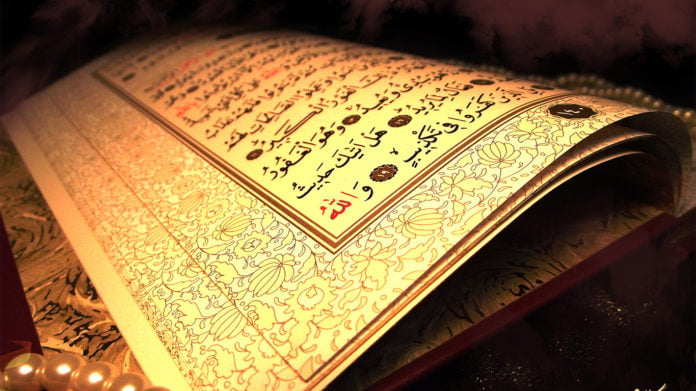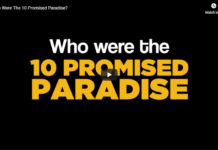| 1) Glorify the name of your Lord, the Most High, 2) who created and gave due proportion, 3) who determined and guided, 4) who brought forth green pasture 5) then turned it to russet stubble. |
Glorify the name of your Lord, the Most High, Allah commands that He be glorified. This includes the fact that He be remembered and worshipped, and that one submit before His grandeur and humble himself before His greatness. He commands that this glorification be worthy of Him such that His Beautiful and Exalted Names are lauded in way that one brings to mind the lofty meaning of every Name that he mentions.
Moreover, that one brings to mind His actions, amongst which are creating: Who created and gave due proportion, in perfect precision and in the best way. Who determined, in due proportion.[1] All ordinances are subject to His determination and guided, all creatures to that determination. This refers to guidance in its general sense meaning that every creature is directed towards what it requires.
Moreover, that one brings to mind His worldly blessings, Who brought forth green pasture, i.e. sends down water from the heaven[2] causing the growth of many varieties of plants and herbs from which both man and animal eat. Thereafter, when the growth has reached its fruition, He causes the stems to bend and wither, and causes the herbs to dry: then turned it to russet stubble, black in colour: dry stalks and decayed foliage.
Moreover, that one brings to mind His religious blessings, the axis of which is the Quran which Allah graced us with:
| 6) We shall cause you to recite it so that you do not forget, 7) save what Allah wills. He knows what is voiced out aloud and what is hidden. 8) We shall pave your way to Ease. |
We shall cause you to recite it, O Muhammad so that you do not forget, i.e. We shall preserve what We have revealed to you of the Book and We shall let your heart grasp it such that you will not forget any of it. In this lies auspicious tidings from Allah to His servant and Messenger, Muhammad ﷺ, that Allah will teach him knowledge that he will never forget. Save what Allah wills, which He will cause you to forget as dictated by His sublime wisdom having therein far-reaching benefits. He knows what is voiced out aloud and what is hidden, such as His knowing what is good for His servants and it is for this reason that He legislates what He wills and judges as He wills. We shall pave your way to Ease, this contains further tidings, auspicious tidings, that Allah will smooth the way for His Messenger ﷺ to a state of ease in all affairs and that He will make his religion and law easy.
| 9) Therefore remind for so long as the reminder profits.* 10) He who fears will take heed, 11) but the most miserable wretch will shun it, 12) such as will burn in the Great Fire 13) where he will neither die nor live. |
Therefore remind, of the Law and Signs of Allah for so long as the reminder profits, i.e. for as long as the reminder gains acceptance and the exhortation is listened to, regardless of whether all or part of the purpose behind the reminder is achieved. The understanding of this verse is that if the reminder is of no benefit such that it, for example, causes an increase in evil or decrease in good, it no longer becomes legislated, rather it now becomes forbidden. In response to the reminder, man is divided into two categories: those who benefit and those who do not benefit. As for those who benefit: He who fears will take heed, because the fear of Allah, Most High, and knowledge of the fact that He will recompense deeds leads the servant to refrain from doing anything that would displease Him, and instead encourages him to hasten towards working righteousness. As for those who do not benefit: But the most miserable wretch will shun it, such as will burn in the Great Fire, kindled for them which rages over the hearts (of people)[3] where he will neither die nor live, being punished with a painful torment, eternal with no respite or decrease. The denizens of Hell will long for death and beg for it, but it will never come, They will not be killed off so that they die and its punishment will not be lightened for them. That is how We repay every thankless man.[4]
| 14) He who has purified himself has succeeded, 15) remembering the name of his Lord and praying. 16) Yet you prefer the life of the world 17) although the Hereafter is better and longer lasting. 18) This is certainly in the earlier scriptures: 19) the scriptures of Abraham and Moses. |
He purifies himself, of shirk, wrongdoing and lowly mannerisms has succeeded, remembering the name of his Lord and praying, clothing himself with the remembrance of Allah such that it imbues his very heart, and this in turn leads him to work deeds that would please Allah, the greatest of which is the prayer upon which faith stands poised. This is the meaning of the verse.
It is also said that the meaning of tazakka is to give zakat al-fitr and that remembering the name of his Lord and praying refers to the `Eid prayer. Although this falls under the meaning of the verse, the verse is not restricted to this alone.
Yet you prefer the life of the world, giving it precedence over the Hereafter: you give preference to its temporal and immediately available blessings over the blessings of the Hereafter, although the Hereafter is better and longer lasting, than the world in every respect. The Hereafter is eternal and pure whereas the world is temporal. Therefore, the intelligent believer will never prefer the worst for the best, he will never trade the joy of a mere hour for eternal damnation. This, that has been mentioned in this blessed chapter is certainly in the earlier scriptures: the scriptures of Abraham and Moses, the best Messengers after Muhammad ﷺ. Therefore the ordinances contained in this chapter are to be found in every Law because they bring about good in both this world and the next, in every place and in every time.
All praise and thanks are due to Allah.
Endnotes
* Another interpretation is in case the reminder profits or the reminder is of use. [Abu Hayyan]
The way of the Prophet (peace and blessings of Allah be upon him) was to recite two Surahs in Jumuah prayer: Sabbih isma rabbika al-Ala (Soorat al-Alaa 87) and al-Ghaashiyah (88), or he would recite al-Jumuah (62) and al-Munaafiqoon (63). [IslamQA, fatwa No. 105329]
…it was narrated that the Prophet (peace and blessings of Allah be upon him) used to recite al-Ala and al-Ghaashiyah in the Eid prayer [IslamQA, fatwa No. 36491]
1. al-Furqan (25): 3
2. al-Baqarah (2): 22
3. al-Humazah (104): 7
4. al-Fatir (35): 36





















